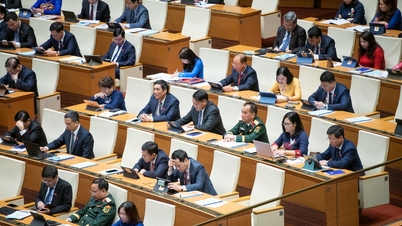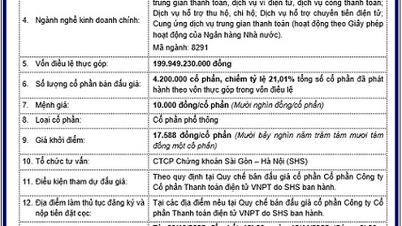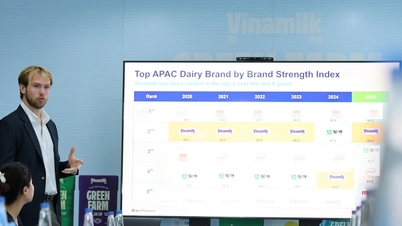Trillions of bonds spent for the wrong purpose
The Government Inspectorate (GIA) has just concluded its inspection of compliance with legal policies on corporate bond issuance with five issuers: Military Commercial Joint Stock Bank (MB); Asia Commercial Joint Stock Bank (ACB); Vietnam Prosperity Joint Stock Commercial Bank (VPBank); Vietnam International Commercial Joint Stock Bank (VIB) and Orient Commercial Joint Stock Bank (OCB).
The inspectors determined that, in the period from January 1, 2015 to June 30, 2023, the above 5 banks successfully issued 386 corporate bond codes (non-convertible bonds, without warrants, without collateral); terms from 1 to 10 years. The total issuance value was VND 255,142 billion.
The purpose of issuance is to increase capital scale, supplement tier 2 capital and other capital to serve customers and serve the credit needs of banks.
As of June 30, 2023, there are 173 TPDN codes in circulation with a total value of about VND 97,828 billion.
Checking the use of funds from corporate bond issuance, the inspector pointed out that three banks,ACB , VPB, and MB, used the money collected from bond issuance for purposes not stated in the issuance plan.

Specifically, according to the reported data, ACB used the proceeds from bonds coded TPACB2018/10Y (issued on December 19, 2018, value of VND 2,200 billion) and bonds coded ACB.2019.04 (December 6, 2019, VND 1,500 billion) to lend medium, long and short term.
Meanwhile, the issuance plan approved by ACB's Board of Directors is to "serve the need for medium and long-term credit".
At VPB, this bank used a total of more than VND 1,259 billion out of a total of VND 5,000 billion from 5 corporate bond codes issued in 2021 and 2022 to lend to short-term customers. However, the purpose of issuing the bond codes is "to supplement working capital to meet VPB's medium- and long-term lending needs in VND".
VPB also used VND2.9 billion of the total VND500 billion from bonds issued in 2016 and VND540 billion of the total VND1,000 billion from bonds issued in 2021 for two short-term loans. Meanwhile, the purpose of the issuance plan is to "lend medium and long-term loans".
MB used proceeds from 11 bond codes issued in 2022, with a total issuance value of VND 1,920 billion, to lend without making investments according to the issuance purposes stated in the pre-issuance information disclosures.
Previously, MB's issuance was aimed at "supplementing long-term Tier 2 capital according to regulations of the State Bank of Vietnam (SBV), serving credit and investment needs as well as increasing the bank's operating capital scale to meet business growth targets in 2022 and the following years".
According to the inspection conclusion, all 5 banks (ACB,OCB , VIB, VPB, MB) did not fulfill their responsibility to manage capital from issuing corporate bonds as prescribed.
These five banks reported that they could not accurately determine the data on the use of proceeds from individual corporate bonds for each loan and each specific customer.
The reason is that all proceeds from issuing corporate bonds are not tracked separately but are mixed into the bank's general business capital. From there, disbursements are made to individuals and organizations that borrow capital, while the bank's business activities are continuous and intertwined, so each customer borrowing capital from the proceeds from issuing corporate bonds is not tracked separately and specifically.
Regarding information disclosure, according to TTCP, all 5 banks also did not disclose information on time as prescribed.
Interest rate differential
According to the Government Inspectorate, a review of data on fixed interest rates of corporate bonds (12-month and 36-month terms) reported by five credit institutions shows a difference compared to the interest rates issued by the State Bank.
In addition, there are differences between banks and between times within the same credit institution. TTCP stated that the application of fixed interest rates in the issuance of corporate bonds by credit institutions is not based on the provisions of Decree No. 153/2020.
The inspection agency said that before May 17, 2021, the subjects allowed to buy corporate bonds issued by credit institutions did not include credit institutions and foreign bank branches.
After Circular No. 01/2021 on the issuance of promissory notes, treasury bills, deposit certificates and domestic bonds by credit institutions and foreign bank branches was issued and took effect, new credit institutions were allowed to purchase corporate bonds issued by other credit institutions.
“With this change, the capital flow between credit institutions is greater than before. In particular, capital from banks in the Big 4 group is transferred to non-state commercial banks with interest rates that have no basis or specific regulations,” the inspection conclusion stated.
The Government Inspectorate believes that it is necessary to review and revise current regulations on corporate bond issuance interest rates of credit institutions to ensure specificity, transparency, and compliance with regulations.
In addition, this agency also requested the State Bank to strengthen its direction in supervising, inspecting, and enforcing legal regulations of banks in the Big4 group when investing in corporate bonds at other banks.
ACB speaks out
In a statement, ACB said that according to the conclusion of the Government Inspectorate, the two bond lots issued on December 19, 2018 and December 6, 2019 had the purpose of using capital clearly stated in the issuance plan as medium and long-term loans.
However, during the inspection, because the reported data at some points in time did not match and included short-term loans, the inspection agency requested the bank to review and correct the situation according to regulations.
ACB confirmed that it had completed all the remedial measures and submitted a report to the authorities on September 24, 2025, in compliance with the authorities' requirements.
The bank also emphasized that it always adheres to governance standards, financial transparency, ensures the rights of shareholders, investors and customers, and maintains stability for sustainable development.
Source: https://vietnamnet.vn/thanh-tra-chinh-phu-diem-ten-3-ngan-hang-lon-dung-von-trai-phieu-sai-muc-dich-2454147.html


![[Photo] National Assembly Chairman Tran Thanh Man holds talks with Hungarian National Assembly Chairman Kover Laszlo](https://vphoto.vietnam.vn/thumb/1200x675/vietnam/resource/IMAGE/2025/10/20/1760952711347_ndo_br_bnd-1603-jpg.webp)
![[Photo] Solemn opening of the 10th Session, 15th National Assembly](https://vphoto.vietnam.vn/thumb/1200x675/vietnam/resource/IMAGE/2025/10/20/1760937111622_ndo_br_1-202-jpg.webp)
![[Photo] Chairman of the Hungarian Parliament visits President Ho Chi Minh's Mausoleum](https://vphoto.vietnam.vn/thumb/1200x675/vietnam/resource/IMAGE/2025/10/20/1760941009023_ndo_br_hungary-jpg.webp)


![[Photo] Prime Minister Pham Minh Chinh meets with Speaker of the Hungarian National Assembly Kover Laszlo](https://vphoto.vietnam.vn/thumb/1200x675/vietnam/resource/IMAGE/2025/10/20/1760970413415_dsc-8111-jpg.webp)






































































































Comment (0)